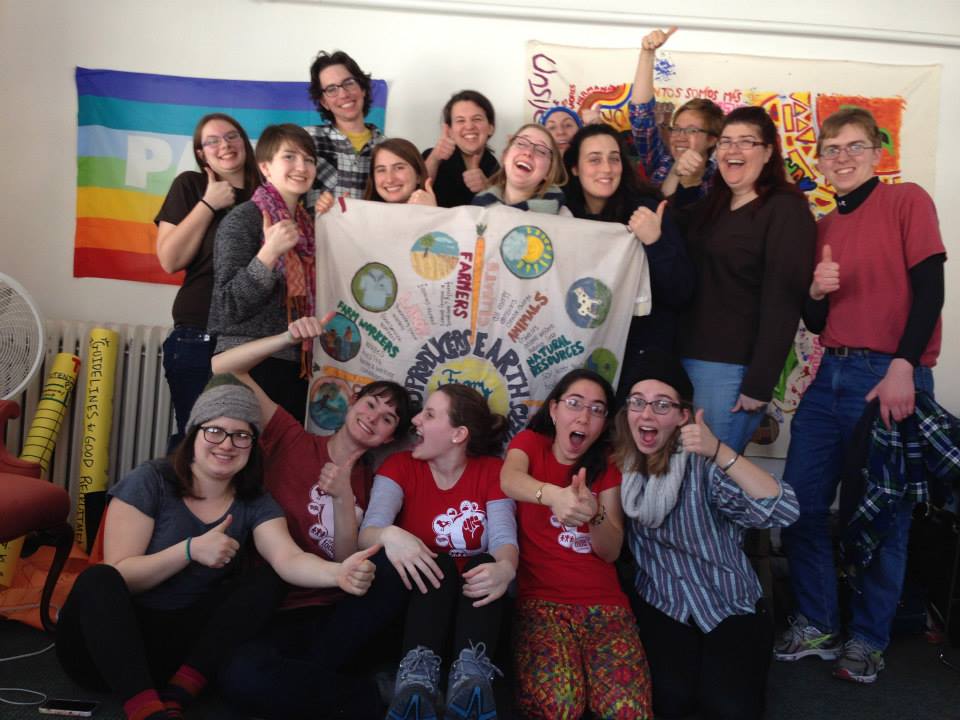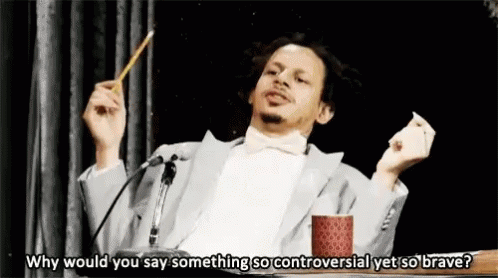Introducing Data for Power-Building

What is the relationship between data and power-building?
Hi! I’m Molly. That's the question I've thought about every day, more or less, for the last two years. In order to spend even more time thinking about it—but much more importantly, to think about it with other people—I'm starting this blog!
Data for Power-Building is a travelog of sorts, charting the landscape of movement data and my own journey through that world. From one perspective, that journey started a long time ago, but from another it’s only just beginning. I've been involved with grassroots community organizing for more than a decade, and have been fighting (affectionately) with databases and spreadsheets for almost as long. On the other hand, I wrote a line of code for the first time in my whole life last month.
So! The unknown parts of this map are vast. But I am truly excited for the exploration.
What "movement data" means, and why it's helpful to distinguish it from the larger-but-still-relatively-niche field of "progressive data," will be an ongoing focus of D4PB.
What does D4PB mean by “power-building”?
In the sticky Iowa summer before my senior year of college, an organizer I’d barely met (although at that point I didn’t think of her as an organizer, because I didn’t know what an organizer was) convinced me to attend a weekend leadership training in Ames. It was a couple hours’ drive from my small college town. I told her I didn’t have a car, but more to the point, I wasn’t a leader. She told me some students from the University of Iowa would be there to pick me up on Thursday morning.
So many things that are now as familiar as my muscles and bones were new to me that weekend. The sound of flip chart paper being ripped off a pad and stuck to the wall. The practice of setting community agreements at the beginning of a gathering. A novel definition of leadership, handwritten in bright bold flip chart marker, that etched itself into my heart:
Leadership is empowering others to achieve their purposes in an uncertain world.
That was 2012, and that training was my first encounter with organizing. In the following year I led a team that rebuilt a student organization, ran a campaign at my college to shift institutional funding from the industrial food system to local, ethical, sustainable producers, “won” the campaign (nominally—the president signed the piece of paper), and learned my first hard lesson about power: if you don’t have the power to implement a victory, it’s not a victory at all.
In that church basement in Ames and an extended montage of offices, conference spaces, and living rooms in my life since—anywhere there’s space for people to sit and a wall to project some slides onto, or to tape up a big sheet of paper—the same conversation has played over and over, its nearly-ritual form providing a steadying continuous thread:
What is power?
In Spanish, the noun for “power”—poder—is the same as the verb “to be able to.”
Power is the ability to act. To be able to realize our visions in the world.
In fact this happened to me most recently just a few weeks ago! At re:power’s 2024 Data Analytics Camp, in a lovely, high-ceilinged, sunny upstairs room at the Children's Museum of Phoenix. The montage continues!
From many years of grappling with this definition in the practice of community organizing, I’d add: building power means bringing more people into the work of realizing a collective vision (for ourselves, for our loved ones, for the world) and giving them reasons to stay—especially, investing in the growth of each person’s capacity for leadership and action.
Power is a complex and contested concept. I’ll dig into other ways of thinking about power as this project goes on. But at least to start with, that’s what I mean by “power-building.” It’s also what I mean by "organizing."
What does D4PB mean by “data”?
In my first ever full-time job, which had nothing to do with organizing, I was put in charge of managing the fundraising/donor database of a midsized environmental nonprofit in Chicago. That database was a 20-year-old, custom-built Microsoft Access system, and it was called “The Rolodex” … because someone on staff built it in the mid-90s to replace the actual, real-life rolodex of the organization’s founding executive director. (This was the first time I’d ever heard of a rolodex.)
That job was terrible, but I was fond of The Rolodex, even as I managed the organization’s transition to a new database and put the ancient Access system out to pasture. Quirks and all, it sparked my interest in data.
I was fascinated by how crucial the reports I ran and sent out every week were to the smooth operation of the organization.
I was horrified by the havoc wreaked by bad or missing data (and by the many mistakes I made while teaching myself how to use the system).
And in that somewhat stuck-in-the-90s office, I could clearly see the transition between pre-computer and computer-age data systems. Besides The Rolodex, a truly on-the-nose example, I also made digital and paper copies of every check we received in the two years I worked there and carefully filed them both in their correct, alphabetized individual donor and institutional funder folders: digital copies in our cloud-based shared drive, paper copies in our massive file cabinets.
Here’s another Ames-church-basement classic:
What is power?
Power is organized people and organized resources.
There’s a slightly different (and in my experience more popular) version: Power is organized people and organized money. That’s helpful for focusing organizers’ attention on money, which is of course crucial, but I think it also limits our imagination in an unhelpful way. There are resources besides money that are fundamental to power-building, resources that are not reducible to something that can be bought.
Here's the core hypothesis of D4PB: Data is one of those fundamental resources.
And the relationship between data and organizing goes way, way back. Data and technology don’t necessarily have anything to do with computers. The first file cabinet was invented in the 1890s. A file cabinet is a technology. A rolodex is a database.

Here in the year 2024, those three things—data, technology, computers—are often inextricable. There are good reasons for that, but they don’t have to be. And there are times when it serves us better to disentangle them.
By data I mean information about people: our people, people we are organizing into leadership and action. Maybe sometimes in the aggregate, but mostly at an individual level. How do we get in touch with them? What are their skills and interests? Has anyone invited them to an event recently?
Probably we will find that this definition is too simple for all the ways we want to think about data and power. Looking forward to it!
Ok, so—what is this blog?
The heart of D4PB is interviews with data practitioners, organizers, researchers, and anyone else working at the intersection of data and organizing.
Other types of posts might cover:
- Case studies from my paid work, developing data infrastructure for grassroots social movement organizations through Tallgrass Consulting
- Reviews of resources related to the theory and practice of movement data
- Deep dives into my own preoccupations (for instance: the potential ramifications of global private equity firm Apax acquiring NGP VAN and EveryAction in 2021)
- Data stories from before the computer age
As (for the time being) a one-person project, D4PB is going to really reflect my own strengths and limitations.
I have a lot of context for grassroots community organizing and the nonprofit industrial complex in the United States, and for political events and social movements that have happened here in my lifetime.
On the other hand, I’m a white U.S. citizen in my mid-thirties. I have a lot to learn about power-building formations outside of institutionalized community organizing, outside of my lived historical experience, outside of the United States, and outside of spaces that are led by white people and primarily shaped by whiteness. That’s part of my hope, and my goal, for this project.
In that spirit! My intention is to begin with the contexts I’m closest to, and spiral out from there. D4PB’s launch series features interviews with three all-star data practitioners at grassroots organizations based in and around my adopted home city: Minneapolis, Minnesota.
D4PB: The Launch Series!
As a subscribed member (it’s free!), you’ll receive new posts in your inbox once or twice monthly, and you’ll be able to access the full archive of posts when you’re signed in to Data for Power-Building.
The launch series posts will be sent out to subscribers over the upcoming weeks, but you can read them all now if you’d like:
- We Make the Road by Walking with Amity Foster of ISAIAH/Faith in Minnesota
- Amity built her role at ISAIAH from scratch over ten years. Now she runs data operations for one of the most dynamic base-building organizations in the country, and (just personally) I've never run into a movement data person who didn't know her name.
- Hypothesize to Win with River Fiocco of TakeAction Minnesota
- TakeAction, like many orgs, had a rocky road through the deep pandemic years, but they've emerged with a distinctive data culture rooted in clarity about the hypotheses they're testing at every level of their work. River's been in the thick of it.
- Trust First with Irving Vázquez of Unidos MN
- Organizing communities where many folks are undocumented presents particular challenges for a data director—especially if, like Irving, your job is actually three or four jobs. At Unidos, he focuses on the basics: building trust, good organizing, and the occasional unforgettable protest sign.
Thanks so much for reading. I hope you’ll come along on this movement data journey, and if you’re having a good time, maybe invite other folks too.
onwards,
Molly
Got an idea for a future post, someone I should talk to, or feedback of any kind? Email me at molly@tallgrassco.com! I'd love to hear from you.